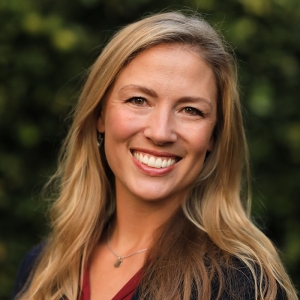MSW graduate empowers young athletes through the transformative capacity of social work
May 05, 2025 / by Jacqueline Mazarella- Students
Two years ago, Allison Chapman decided she was no longer going to put off earning an advanced degree. The daughter of a licensed clinical social worker (LCSW) and granddaughter of a clinical psychologist, she grew up in a family who volunteered together in the community.
“I was always at a shelter or other service organization, always raised to do something for someone else,” Chapman said. “I feel like I’ve been a social worker my whole life.”
When she was accepted into the Master of Social Work (MSW) program at the USC Suzanne Dworak-Peck School of Social Work, Chapman, mother of six children, forged ahead.
“Two years are going to pass, and they'll be a little stressful no matter what, so I might as well have a degree at the end of it,” Chapman said.
In May 2025, she receives her MSW from USC, equipped with a plan to bring the healing power of social work to young athletes. Chapman was fortunate to be a student in the MSW program when USC Social Work launched a new course — The Transforming Power of Social Work and Sports — during her final semester. Led by Stephen Hydon, teaching professor and director of social work in schools, the course is open to all USC students, regardless of discipline, who are interested in positively impacting the mental health development of athletes from elementary school to professionals.
An athlete herself, when Chapman decided not to pursue sports in college, it was an emotional decision that affected her sense of self for years. Now, Chapman firmly believes in “once an athlete, always an athlete,” and is focused on helping young athletes through their life transitions.
“There's been an empowering part of this course for me,” Chapman said. “I will never lose the athlete in me. So how can we help the transitions of our athletes?”
Resiliency, tenacity and mindfulness
Growing up, Chapman, her seven siblings and their parents all participated in sports at a high level, coupled with their community service — both activities being integral to their lives. As her own children began participating in sports, she saw an ugly side of youth athletics in this age of social media. In San Diego County, where she and her family reside, influencers follow and post about local high school athletes, creating a pressure-filled environment for them.
Following a personally challenging time, Chapman fell in love with yoga. In the beginning, she loved the physical workout but hated meditating. Then, she began to realize a calmness in her brain by embracing the meditation element of yoga, and the more she practiced the better she felt both physically and emotionally.
Through her MSW studies, and specifically Hydon’s course, Chapman fused her knowledge and experience with athletics and yoga into a new career opportunity. Her goal is to imbue young athletes with an emotional/physical connection so they may use the skills they learn in sports to be healthy, mindful adults throughout their lives.
Chapman developed Mind Body Athletes, a program which uses workbooks, yoga and mindfulness to help youth view middle school and high school athletics as a training ground for developing and mastering skills that can be used in all aspects and facets of life. It includes collaboration with coaches to ensure everyone is speaking the same language, with an eye on resiliency, mental tenacity and injury prevention. Chapman tested the program with her son’s high school basketball team, and they loved it. She expanded it to her daughter’s club volleyball team, and then a few more local teams.
According to Chapman, the plan for Mind Body Athletes is for it to be accessible to students of all genders, ages 12-18. She feels it would be particularly beneficial to young male athletes, as adolescent males are less likely to articulate their mental health struggles but two to four times more likely to commit suicide than females.
She recently pitched her abstract for Mind Body Athletes to the Alliance for Social Work in Sports Conference at the University of Tulane and is selected to present at the conference in fall 2025. For the next several months, Chapman will continue to collect data from the test sites where the program is currently implemented to further prove the concept.
“From the very first class, Allison was committed to making a difference in the lives of young athletes through her own perseverance and ambition,” Hydon said. “Her Mind Body Athletes program embodies the true spirt of mental health awareness and sports. I'm proud to see her pursue one of her career aspirations to bring these experiences to youth.”
Focused on the future of youth athletics
Looking ahead, Chapman plans to split her time between private practice therapy and further developing Mind Body Athletes. She focuses on dialectical behavior therapy (DBT), where the "wise mind" is a state of balance between emotional and rational thinking, allowing individuals to make decisions that are both thoughtful and intuitive. It's about recognizing and respecting emotions while also making decisions based on facts and logic.
Long-term, she hopes to train others in how to implement Mind Body Athletes so that it may be replicated wider. Chapman is also looking to bring her program to lower-income communities through grant funding, making it affordable for their public middle and high schools.
“I see the program as acceptance commitment therapy (ACT),” Chapman said. “Young athletes will understand that you can still have some power in your life to accept the challenge but also increase that space where you're not judging yourself.”
To reference the work of our faculty online, we ask that you directly quote their work where possible and attribute it to "FACULTY NAME, a professor in the USC Suzanne Dworak-Peck School of Social Work” (LINK: https://dworakpeck.usc.edu)
